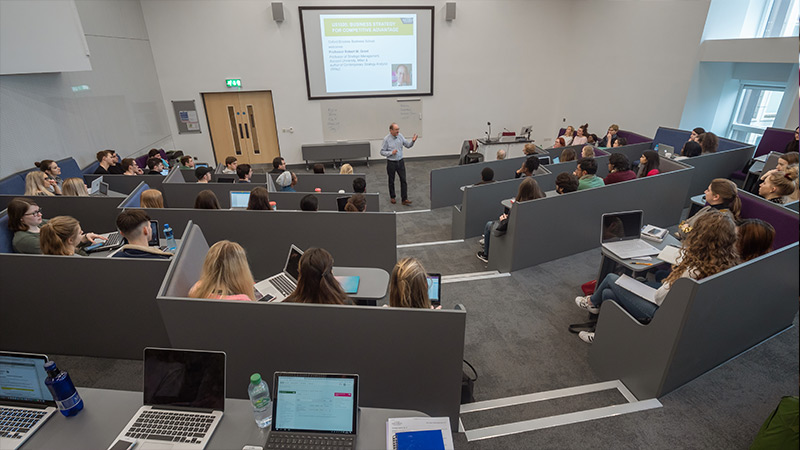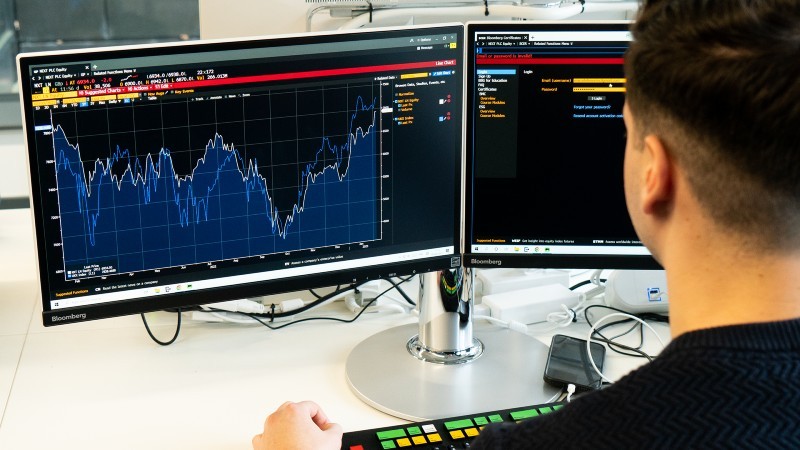Accounting and Economics
BSc (Hons)
Register here to join a live webinar and find out more about this course
UCAS code: NL41
Start dates: September 2026
Full time: 3 years, or 4 if a work placement is chosen
Part time: up to 8 years
Location: Headington
School(s): Oxford Brookes Business School
Overview
Build valuable accounting skills and a strong understanding of economics with our BSc Accounting and Economics program at Oxford Brookes University. This course combines academic study with practical experience to prepare you for a rewarding career in business.
You’ll have the flexibility to tailor the course to your interests and goals:
- Placement Year: Gain real-world experience with top employers like Deloitte, Metro Bank, Marriott Hotels, PWC, Chelsea FC, or Apple.
- Optional Modules: Sharpen your fiscal skills by choosing modules that suit your career aspirations.
- Final Year Focus: Specialize in accounting, economics, or a blend of both.
You’ll learn from a community of experts, including experienced economists, qualified accountants, and guest speakers who will share valuable insights. Stay ahead of industry trends in areas like environmental economics and business taxation, ensuring you graduate ready to launch a successful career in accountancy or economics.

Why Oxford Brookes University?
-
International community
With staff and students from all over the world, you’ll gain different perspectives on the subject.
-
Personalise your experience
Optional modules and different final year pathways let you discover your passion and focus on your interests.
-
Gain experience
We believe you should learn through experiences, so much of the course is practical. You also have the option to go on placement to gain practical business experience.
-
Cutting-edge research
Oxford Brookes Business School is exploring big issues like AI and corporate responsibility. Be part of our forward-looking community.
-
Open up career paths
The skills you learn will be useful in a huge range of careers, whether you want to work in a global corporation, government, academia, or set up your own company.
-
Additional language modules
Our university-wide language programme is available to full-time undergraduate and postgraduate students on many of our courses, and can be taken as a credit on some courses.
-
Study abroad
You may be able to go on a European or international study exchange while you are at Brookes. Most exchanges take place in the second year. Although we will help as much as we can with your plans, ultimately you are responsible for organising and funding this study abroad.
-
Accreditation(s)
Accredited by Association of Chartered Certified Accountants (ACCA) Chartered Institute of Management Accountants (CIMA) and Institute of Chartered Accountants in England and Wales (ICAEW)
Course details
Study modules
In your final year compulsory modules you'll choose Accounting Synoptic or Perspectives on Global Economics. Your other final year compulsory modules that you will complete are Financial Accounting Theory, Business Aspects of Management Accounting and Contemporary Issues in Economics.
Teaching for this course takes place Face to Face and you can expect around eight hours of contact time per week. In addition to this, you should also anticipate a workload of
1,200 hours per year. Teaching usually takes place Monday to Friday, between 9.00am and 6.00pm.
Contact hours involve activities such as lectures, seminars, practicals, assessments, and academic advising sessions. These hours differ by year of study and typically increase significantly during placements or other types of work-based learning.
Please note: As our courses are reviewed regularly as part of our quality assurance framework, the modules you can choose from may vary from those shown here. The structure of the course may also mean some modules are not available to you.
Careers
We’ve created a supportive environment. Your tutors will make sure you develop professional skills throughout the course, and help you discover a career destination that’s right for you.
Past graduates on our accounting, business, finance, and economics courses often go into accountancy based roles in the financial sector and are working in organisations like:
- KPMG
- PricewaterhouseCoopers
- Grant Thornton
- Haines Watts
- HM Treasury
- Foreign & Commonwealth Office.
If you’re not ready to jump straight into work at an established organisation, there are other options too. Some students go on to postgraduate study, others join graduate schemes. Some even start their own business.
Your practical skills and deep knowledge of accountancy and economics will be valuable whatever your destination.
Related courses
Entry requirements
Wherever possible we make our conditional offers using the UCAS Tariff. The combination of A-level grades listed here would be just one way of achieving the UCAS Tariff points for this course.
Standard offer
UCAS Tariff Points: 112
A Level: BBC
IB Points: 27
BTEC: DMM
Contextual offer
UCAS Tariff Points: 88
A Level: CCD
IB Points: 24
BTEC: MMM
Further offer details
Applications are also welcomed for consideration from applicants with European qualifications, international qualifications or recognised foundation courses. For advice on eligibility please contact Admissions: admissions@brookes.ac.uk
If you don’t achieve the required tariff points you can apply to join a foundation course, like Foundation in Business or an international foundation course to help to reach the required level for entry onto this degree.
Specific entry requirements
GCSE: Mathematics (grade C/4 or above)
Please also see the University's general entry requirements.
English language requirements
Please see the University's standard English language requirements.
Pathways courses for international and EU students
If you do not meet the entry requirements for this degree, or if you would like more preparation before you start, you can take an international foundation course. Once you enrol, you will have a guaranteed pathway to this degree if you pass your foundation course with the required grades.
If you only need to meet the language requirements, you can take our pre-sessional English course. You will develop key language and study skills for academic success and you will not need to take an external language test to progress to your degree.
English requirements for visas
If you need a student visa to enter the UK you will need to meet the UK Visas and Immigration minimum language requirements as well as the University's requirements. Find out more about English language requirements.
Credit transfer
Many of our courses consider applications for entry part-way through the course for students who have credit from previous learning or relevant professional experience.
Find out more about transferring to Brookes. If you'd like to talk through your options, please contact our Admissions team.
Terms and conditions of enrolment
When you accept our offer, you agree to the Terms and Conditions of Enrolment. You should therefore read those conditions before accepting the offer.
International qualifications and equivalences
How to apply
Application process
Full time international applicants can also apply through UCAS
Tuition fees
Questions about fees?
Contact Student Finance on:
Tuition fees
Please note, tuition fees for Home students may increase in subsequent years both for new and continuing students in line with an inflationary amount determined by government. Oxford Brookes University intends to maintain its fees for new and returning Home students at the maximum permitted level.
For further information please see our tuition fees FAQs.
Tuition fees for International students may increase in subsequent years both for new and continuing students.
The following factors will be taken into account by the University when it is setting the annual fees: inflationary measures such as the retail price indices, projected increases in University costs, changes in the level of funding received from Government sources, admissions statistics and access considerations including the availability of student support.
How and when to pay
Tuition fee instalments for the semester are due by the Monday of week 1 of each semester. Students are not liable for full fees for that semester if they leave before week 4. If the leaving date is after week 4, full fees for the semester are payable.
- For information on payment methods please see our Make a Payment page.
- For information about refunds please visit our Refund policy page
Additional costs
Please be aware that some courses will involve some additional costs that are not covered by your fees. Specific additional costs for this course are detailed below.
Optional costs
| Additional costs | Amount (£) |
|---|---|
It’s your responsibility to cover print / binding costs where coursework submission is required. Please note that a lot of the coursework is now submitted online. |
From £30 |
| You may choose to purchase books to support your studies. Many books on our reading lists are available via the Library, or can be purchased secondhand. | £20-60 per book |
Accommodation fees in Brookes Letting (most do not include bills) |
£107-301 per week |
Accommodation fees in university halls (bills included, excluding laundry costs) |
£139-248 per week |
Graduation costs include tickets, gowning and photography. Gowns are not compulsory but typically students do hire robes, starting at £41. |
Typically £0-200 |
Students are responsible for their own travel to and from university for classes. For the 2025/26 academic year, the University is introducing an alternative subsidised travel offer for all students with further information on our Travel webpages. |
From £10 |
Funding your studies
Financial support and scholarships
Featured funding opportunities available for this course.
All financial support and scholarships
Information from Discover Uni
Full-time study
Part-time study
Programme changes:
On rare occasions we may need to make changes to our course programmes after they have been
published on the website. For more information, please visit our
changes to programmes page.




